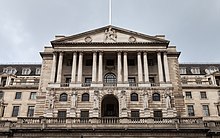
Back نظرية النمو الداخلي Arabic Desenvolupament endogen Catalan Endogene Wachstumstheorie German Teoría del crecimiento endógeno Spanish نظریه رشد درونزا Persian Endogeenisen kasvun teoria Finnish Théorie de la croissance endogène French Teoria della crescita endogena Italian Endogenous growth model Laothian Endogene groeitheorie Dutch
| Development economics |
|---|
 |
| Economies by region |
| Economic growth theories |
| Fields and subfields |
| Lists |
| Part of a series on |
| Macroeconomics |
|---|
 |
Endogenous growth theory holds that economic growth is primarily the result of endogenous and not external forces.[1] Endogenous growth theory holds that investment in human capital, innovation, and knowledge are significant contributors to economic growth. The theory also focuses on positive externalities and spillover effects of a knowledge-based economy which will lead to economic development. The endogenous growth theory primarily holds that the long run growth rate of an economy depends on policy measures. For example, subsidies for research and development or education increase the growth rate in some endogenous growth models by increasing the incentive for innovation.
- ^ Romer, P. M. (1994). "The Origins of Endogenous Growth". The Journal of Economic Perspectives. 8 (1): 3–22. doi:10.1257/jep.8.1.3. JSTOR 2138148.
© MMXXIII Rich X Search. We shall prevail. All rights reserved. Rich X Search